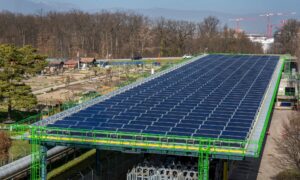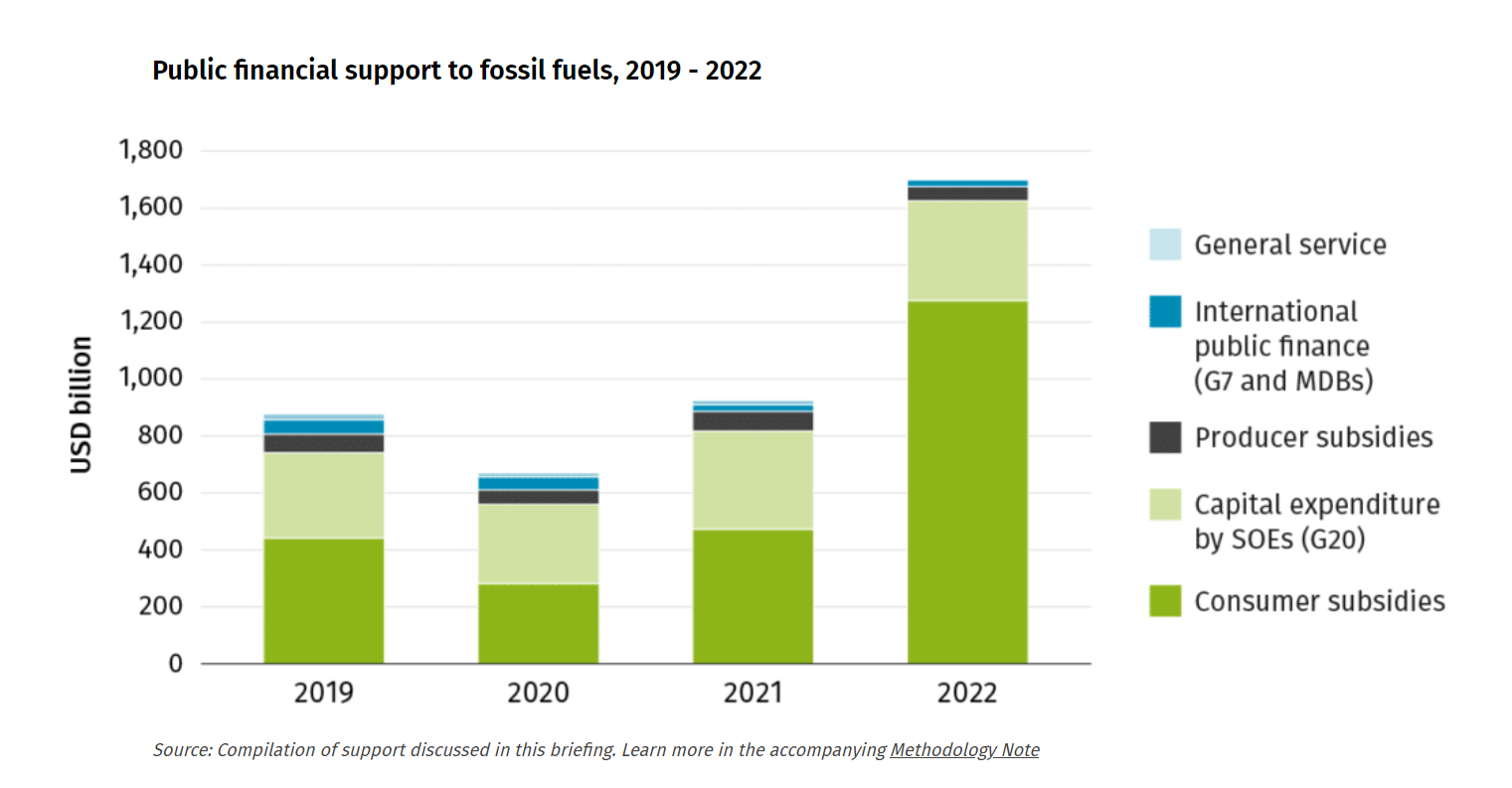Nouvelle
Transition to Sustainable Energy and the Role of Geneva
Energy drives economies and sustains societies, but its production and use are the most significant contributors to global warming, accounting for roughly two-thirds of human-induced greenhouse gas emissions. Several organizations in International Geneva are taking action toward a transition to sustainable energy for a cleaner future.
About Sustainable Energy
Following the definition of sustainable development in the 1987 Brundtland Report « Our Common Future », sustainable energy can be seen as energy which meets the needs of present generations without compromising the ability of future generations to meet their own needs.
The energy supply sector is the largest contributor to global greenhouse gas emissions. Around 80% of global energy and 66% of electrical generation are supplied from fossil fuels, contributing to approximately 60% of the greenhouse gas (GHG) emissions responsible for climate change. A transition to cleaner forms of energy has already begun in many countries, but despite the recent fast rate of technological innovation and cost reduction, renewable energy and energy efficiency technologies must still compete with highly subsidized carbon-intensive energy technologies.
Sustainable Development Goal 7
Ensure access to affordable, reliable, sustainable and modern energy for all
Nearly 9 out of 10 people now have access to electricity. However, this still leaves 789 million people around the world without electricity to fulfill their essential needs. As 3 billion people still rely on wood, charcoal or animal waste for cooking and eating, ensuring access to clean, affordable, reliable and modern energy is an important component of sustainable development. In most places, current energy systems have negative impact on the climate, the environment and health. Energy production and use is responsible for 60% of global greenhouse gas emissions and is the most important source of anthropogenic air pollution, accounting for 85% of particulate matter and almost all of the sulfur oxides and nitrogen oxides.
In this context, moving away from fossil fuels as an energy source is key to achieve the Sustainable Development Goals. SDG7 in particular addresses the need for more sustainable energy systems for all. Access to clean and affordable energy is also essential to achieve other SDGs, including SDG 1 (No poverty), SDG 3 (Good health and wellbeing), SDG5 (Gender equality), SDG9 (Industry, innovation and infrastructure), SDG11 (Sustainable cities and communities), and SDG13 (Climate Action).
Progress Toward SDG 7: More Efforts Needed
Despite progress, the world is not on track to achieve Sustainable Development Goal 7 (SDG7). In 2021, the High-level Dialogue on Energy, the first global gathering on energy under the auspices of the United Nations General Assembly since 1981, resulted in the Global Roadmap for Accelerated SDG 7 Action, providing a guide for collective action on energy across sectors. The Roadmap also includes two sets of milestones for 2025 and 2030. The Dialogue also triggered some 200 Energy Compacts with voluntary commitments of over $600 billion USD into SDG 7. These achievements must now be used as the foundation for transformational change through just, inclusive and equitable energy transitions.
In 2023, at the High-level Political Forum (HLPF) SDG 7 was reviewed for the second time since the 2018 review. The outcomes of the review of SDG7 will feed the Global Stocktake on SDG7 Implementation to take place in April 2024, as mandated by the General Assembly.
According to the Sustainable Development Goals Report 2023, the current pace of progress is insufficient to achieve SDG 7 by 2030, and will result in 660 million people still lacking access to electricity and close to 2 billion people relying on polluting fuels and technologies for cooking. While renewable energy is booming in developing countries, the continued declining trend in the international public financial flows in support of clean energy in developing countries must be boosted to be on track with SDG7. According to UNCTAD’s World Investment Report 2023, developing countries need renewable energy investments of about $1.7 trillion each year but attracted only $544 billion in clean energy foreign direct investment in 2022.
Progress has also been observed in renewable energy use in the electricity sector, but limited in heating and transport. Overall, energy efficiency targets are lagging behind and to make up for lost time, energy intensity improvements will need to average 3.4 percent per year until 2030.
The Energy Progress Report 2023, produced jointly by the International Renewable Energy Agency (IRENA), the International Energy Agency (IEA), the United Nations Statistics Division (UNSD), the World Bank, and the World Health Organization (WHO), reaches similarly alarming conclusions. If current trends continue, 660 million people will still lack access to electricity and 2 billion people will not reach even 90 percent clean cooking coverage by 2050. . Between 2010 and 2019, the share of renewables in total final energy consumption grew by only 2.7 percentage points, despite increasing development of renewable energy projects. This highlights the need of addressing energy demand, by furthering efforts in energy efficiency and conservation.
UN Decade of Sustainable Energy for All
In December 2012, the UN General Assembly unanimously declared the decade 2014‑2024 as the Decade of Sustainable Energy for All (A/RES/67/215), underscoring the importance of improving access to reliable, affordable, economically viable, socially acceptable and environmentally sound energy services and resources for sustainable development. The resolution calls upon Member States to « galvanize efforts to make universal access to sustainable modern energy services a priority » and « to combine, as appropriate, the increased use of new and renewable energy resources, more efficient use of energy, greater reliance on advanced energy technologies, including cleaner fossil fuel technologies, and the sustainable use of traditional energy resources, to meet the increasing need for energy services ».
In response, Former UN Secretary-General Ban Ki-moon launched the Sustainable Energy for All initiative in 2011, which brings together governments, the private sector and civil society to mobilize action towards three objectives:
- Provide universal energy access
- Double the rate of global energy efficiency improvement
- Double the share of renewable energy in the global energy mix
International Day of Clean Energy
The observation of the International Day of Clean Energy on 26 January was declared in 2023 by the General Assembly (resolution A/77/327) as a call to raise awareness and mobilize action for a just and inclusive transition to clean energy for the benefit of people and the planet.
26 January also marks the founding date of the International Renewable Energy Agency (IRENA), a global intergovernmental agency established in 2009 to support countries in their energy transitions, serve as a platform for international cooperation, and provide data and analyses on clean energy technology, innovation, policy, finance and investment.
Energy lies at the core of a double challenge: leaving no one behind and protecting the planet, which makes ensuring that energy comes from clean sources crucial. For populations without clean energy access, the lack of reliable power hinders education, healthcare, and economic opportunities, and many of these developing regions still rely heavily on polluting fossil fuels for their daily life, perpetuating poverty. Adopting clean energy is integral to tackle climate change, as energy production and the use of fossil fuels (oil, coal, and gas) to generate electricity and heat have a heavy toll on global emissions.
Transitioning Away from Fossil Fuel
« Fossil fuel phase out is inevitable whether they like it or not. Let’s hope it doesn’t come too late. »
— UN Secretary-General António Guterres, at the closing of the UN Climate Change Conference COP28
The 2023 UN Climate Change Conference (COP28) that took place in Dubai, United Arab Emirates from 30 November to 13 December 2023, was also the moment when the world took stock of its progress on the Paris Agreement and agreed to « transitioning away from fossil fuels in energy systems, in a just, orderly and equitable manner, accelerating action. »
Fossil fuels are the single biggest contributor to the climate crisis. Moving away from fossil fuels is essential in the transition towards sustainable energy. The Intergovernmental Panel on Climate Change (IPCC) — the most authoritative scientific source on climate change — has, since its Fourth Assessment Report, dedicated in the Mitigation of Climate Change an entire chapter to energy systems, clarifying the role of fossil fuel in increasing the levels of GHG emissions in the atmosphere and the importance of swiftly moving to cleaner energy sources.
Limiting warming to well below 2°C will require substantial energy system changes over the next 30 years. This includes reduced fossil fuel consumption, increased production from low- and zero-carbon energy sources, and increased use of electricity and alternative energy barriers.
— Energy Systems, In IPCC, 2022: Climate Change 2022: Mitigation of Climate Change
The science is clear: to limit climate change, we need to end our reliance on them and invest in alternative sources of energy that are clean, accessible, affordable, sustainable, and reliable. Various efforts from Geneva to transition away from fossil fuels are listed below.
Fossil Fuel Non-Proliferation Treaty
According to a 2021 study published in Nature, scientists concluded that at least 90% of coal reserves and 60% of oil and gas reserves must remain in the ground by 2050 in order to limit temperature increase under 1.5°C above pre-industrial levels. However, while governments have committed to reduce fossil fuel consumption under the Paris Agreement, there is currently no binding mechanisms that limits fossil fuel production. Therefore, a network of over 400 organizations have launched a campaign advocating for a Fossil Fuel Non-Proliferation Treaty (FF NPT). This initiative calls for a global binding instrument to « phase out fossil fuels, support dependent economies, workers and communities to diversify away from fossil fuels, ensure 100% access to renewable energy globally and promote a just transition that leaves no-one behind ».
Various organizations in Geneva have expressed their support for the initiative, including the Center for International Environmental Law. In April 2022, the City of Geneva passed a motion in support of the treaty, making it the first Swiss city to publicly show its support for the initiative. Geneva and Switzerland do not produce fossil fuels, but host numerous oil traders, as well as many financial institutions which play an important role in fossil fuel investments. In September 2022, the World Health Organization (WHO), jointly with professional organizations from the health sector, expressed its support for the initiative in a letter underlining the health risks of climate change.
Read more about the Fossil Fuel Non-Proliferation Treaty:
- Nauru and Samoa Join Fossil Fuel Treaty Amid Fierce Debate at COP28 | The Diplomat | 11 December 2023
- Q&A: How a Fossil Fuel Treaty Could Support the Paris Agreement and Wind Down Production | Inside Climate News | 6 December 2023
- WWF announces support for Fossil Fuel Non-proliferation Treaty | WWF | 21 September 2023
- Upcoming IPCC Report Must Signal to Polluters their Time is Up| Climate Action Network International |10 March 2023
- Building a fossil fuel non-proliferation treaty: Key elements | Peter Newell, Harrovan Asselt, and Freddie Daley | Earth System Governance | December 2022
- What is the fossil fuel non-proliferation treaty? | The Guardian
- Health groups call for global fossil fuel non-proliferation treaty | The Guardian | 14 September 2022
- To Tackle Climate Change, Keep Fossil Fuels in the Ground | Stewart M. Patrick | Council on Foreign Relations | 9 December 2021
- This is why we need the Fossil Fuel Non-Proliferation Treaty | Alex Rafalowicz | World Economic Forum | 19 August 2021
- Towards a Fossil Fuel Non-Proliferation Treaty | Peter Newell and Andrew Simms | Climate Policy | 8 July 2019
Reforming Fossil Fuel Subsidy
Despite scientific consensus on the role of fossil fuel in climate change and the subsequent risks for human societies, fossil fuel remain highly subsidized in many places around the world. Such subsidies can take the form of tax breaks or direct payments that reduce the cost of producing coal, oil or gas, or regulations that support consumption by artificially reducing prices for the end-user. Fossil fuel subsidies are one of the biggest financial barriers hampering the world’s shift to renewable energy sources. According to the Energy Policy Tracker, in 2022, public financial support for fossil fuels, in the form of subsidies, investments by state-owned enterprises (SOEs), and lending from public financial institutions, exceeded USD 1.7 trillion globally—a record high.
While SDG12 Target 12.c (Responsible Consumption and Production) explicitly refers to the importance of addressing fossil fuel subsidies and parties to the United Nations Framework Convention on Climate Change pledged to « transitioning away from fossil fuels in energy systems, in a just, orderly and equitable manner, accelerating action in this critical decade, to achieve net zero by 2050 in keeping with the science » in the first Global Stocktake under the Paris Agreement, the current levels of subsidies allocated to fossil fuel do not match such ambitions.
Fossil Fuel Subsidy Reform at the World Trade Orgnization
Formed in June 2010, the Friends of Fossil Fuel Subsidy Reform (FFFSR) is an informal group of non-G20 countries aiming to build political consensus on the importance of fossil fuel subsidy reform. Current members of the “Friends” group are Costa Rica, Denmark, Ethiopia, Finland, New Zealand, Norway, Sweden, Switzerland, and Uruguay. At the WTO Eleventh Ministerial Conference (MC11) in 2017, a coalition of 12 WTO members signed the FFFSR’s first Ministerial Statement, calling on the WTO to “achieve ambitious and effective disciplines on inefficient fossil fuel subsidies that encourage wasteful consumption including through enhanced WTO transparency and reporting that will enable the evaluation of the trade and resource effects of fossil fuel subsidies programmes.” The Ministerial Statement also noted that any efforts to phase out fossil fuels must consider the needs of the poor.
Building on that effort, the initiative renewed its statement in December 2021 and is now coordinated by New Zealand and supported by 48 WTO members as co-sponsors. The renewed statement – subsequently revised in June 2022 (WT/MIN(21)/9/Rev.2) – seeks the rationalization and phase-out, along a clear timeline, of inefficient fossil fuel subsidies that encourage wasteful consumption and calls on WTO members to join those efforts. The statement recognizes that reforming fossil fuel subsidies must consider the specific needs and circumstances of developing countries and minimize the possible adverse impacts it may have on their development.
Read more about fossil fuel subsidies:
- Global Subsidy Initiative | IISD
- Fossil Fuel Subsidy Tracker | IISD & OECD
- Fossil fuel support data by country | OECD
- Climate Change – Fossil Fuel Subsidy | IMF
- Fossil Fuel Subsidy Reform meeting advances work in lead-up to MC13 | WTO | 24 November 2023
- Uncertain Climate Impact and Several Open Questions: An analysis of the proposed reform of the Energy Charter Treaty | IISD | 10 October 2022
- Support for fossil fuels almost doubled in 2021, slowing progress toward international climate goals, according to new analysis from OECD and IEA | 29 August 2022
- Background Note on Fossil Fuel Subsidy Reform | IISD | 29 August 2022
- How to avert a global energy crisis? Tax fossil fuels, boost renewables and turn down the heater, says UN | Geneva Solutions | 4 August 2022
- Energy price surge underlines need to accelerate clean energy transitions rather than subsidise fossil fuels | OECD & IEA | 2 November 2021
- Why fossil fuel subsidies are so hard to kill | Jocelyn Timperley | Nature | 20 October 2021
- Cutting Emissions Through Fossil Fuel Subsidy Reform and Taxation | IISD | 4 July 2021
- How to rein in fossil fuel subsidies ? Towards a New WTO Regime | Simon Happersberger, Eleanor Mateo & Selcukhan Ünekbas | The Graduate Institute | 2021
- Members Call for WTO to Play a Central Role in Ending Inefficient Fossil Fuel Subsidies | IISD | 10 December 2017
Renewable Energy
Energy production is a huge contributor to climate challenges and key to their solutions. As still large majority of energy production is based on the burning of fossil fuels — the largest contributor to global climate change — accounting for over 75 percent of global greenhouse gas emissions and nearly 90 percent of all carbon dioxide emissions, transitioning to renewable energy is the single fastest measure to significantly cut emissions.
Renewable energy sources – which are available in abundance all around us, provided by the sun, wind, water, waste, and heat from the Earth – are replenished by nature and emit little to no greenhouse gases or pollutants into the air. Although fossil fuels remain the biggest sources of global energy production, renewable sources of energy, such as wind, solar, hydro, and geothermal, now power about 29% of electricity worldwide. The IEA Renewables 2023 Report also found that global annual renewable capacity additions increased by almost 50% to nearly 510 gigawatts (GW) in 2023, largely driven by China’s solar PV market while the investment in clean energy has risen by 40% since 2020.
Renewable Energy and the UN Climate Change Conference
The outcomes of the first Global Stocktake at COP28 call upon States towards « tripling renewable energy capacity globally and doubling the global average annual rate of energy efficiency improvements by 2030, » in recognition of the need for deep, rapid, and sustained reductions in greenhouse gas emissions in line with 1.5 °C pathways (FCCC/PA/CMA/2023/L.17/par.28). Outcomes also include, among others:
- Accelerating efforts towards the phase-down of unabated coal power;
- Accelerating efforts globally towards net zero emission energy systems, utilizing zero- and low-carbon fuels well before or by around mid-century;
- Accelerating zero- and low-emission technologies, including, inter alia, renewables, nuclear, abatement and removal technologies such as carbon capture and utilization and storage, particularly in hard-to-abate sectors, and low-carbon hydrogen production;
This was also highlighted in the Global Renewables and Energy Efficiency Pledge that aims to triple renewable energy capacity by 2030, or at least 11,000 GW, and must double the global average annual rate of energy efficiency improvements from around 2% to over 4% every year until 2030, pledged by more than 130 national governments.
Read more about renewable energy and the UN Climate Change Conference:
- Renewable Energy & A Brief Guide to Renewables| UNFCCC
- Global Renewables And Energy Efficiency Pledge | COP28
- Climate Action from Geneva to Dubai | UN Climate Change Conference COP28 | GEN
Critical Minerals and Renewable Energy
The transition towards a low-carbon future through clean and renewable energy places critical minerals, such as cobalt, copper, lithium, nickel, and rare earths, at the forefront of the global environmental agenda.
Due to the crucial role that they play in the production of clean energy technologies, they have become increasingly in demand, as annual trade in energy-related critical minerals has already increased from US$ 53 billion to US$ 378 billion over the past 20 years. The IEA has also projected that consumption of these minerals could increase by at least sixfold by 2050 if we were to achieve net-zero by mid-century.
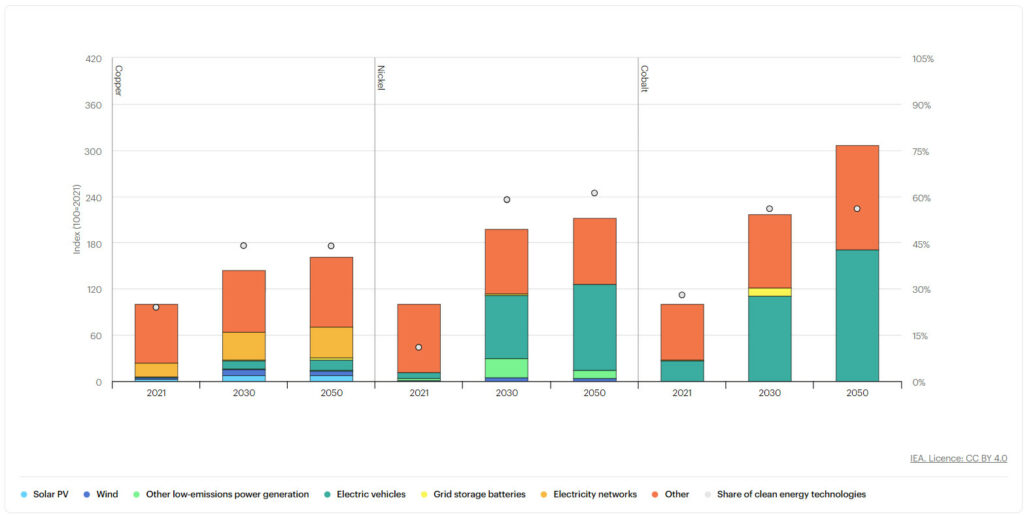
Total demand for selected minerals by end use in the Net Zero Scenario, 2021-2050, IEA, Paris. Data as of 19 January 2024. License: CC BY 4.0
With this growing need, however, comes increasing pressure on supply chains, particularly in developing countries that hold large reserves of these minerals. African countries, for example, have about 25 percent of global reserves, including 19 percent of those needed for EVs. Many developing countries are already playing a vital role in supplying world markets, such as the Democratic Republic of the Congo, from where 68 percent of cobalt imports originate, Chile, a significant lithium exporter, and Indonesia, which accounts for 48 percent of nickel exports (UNCTAD 2023).
In the face of environmental, social, economic, geopolitical, trade, and partnership challenges and opportunities, harnessing the potential of critical energy transition minerals will require putting the necessary social and environmental safeguards in place, while ensuring inclusive spaces for engagement, including Indigenous Peoples and local communities.
Read more about renewable energy and critical minerals:
- Critical Minerals | IEA
- What are energy transition minerals and how can they unlock the clean energy age? | UNEP | 19 February 2024
- High demand for energy-related critical minerals creates supply chain pressures | WTO | 10 January 2024
- COP28: UN urges coordinated action to align soaring Critical Raw Materials extraction and use with sustainable development | UNECE | 6 December 2023
- Critical minerals: Supply chains, trade flows and value addition | UNCTAD | 3 December 2023
- The Future is Circular – Circular Economy and Critical Minerals for the Green Transition | SINTEF | 2022
- Minerals for Climate Action: The Mineral Intensity of the Clean Energy Transition | Climate Smart Mining | 2020
- Renewable Energy Sources and Climate Change Mitigation | IPCC | 2011
Sustainable Energy and Human Rights
Climate change is an existential threat to people and the planet. Its harmful effects undermine the full enjoyment and realization of all human rights disproportionately affecting women, refugees, Indigenous Peoples, and those already in vulnerable situations. As such, the transition from fossil fuels to renewables builds towards the realization of all human rights, including the right to a clean, healthy, and sustainable environment.
Since the adoption of the Paris Agreement in 2015, a growing number of stakeholders in the extractive sector worldwide have announced, or are currently developing, commitments and plans to implement energy transition programmes. However, concerns have emerged over their design and implementation, and in particular the sourcing of critical transition minerals, that may further exacerbate human rights abuses related to the extractive sector.
According to the Working Group on the issue of human rights and transnational corporations and other business enterprises, energy transition programmes by different actors, including companies, have been linked or have contributed to serious human rights abuses, such as land-grabbing, forced displacement, modern slavery, discrimination and environmental pollution, among others (A/78/155). Moreover, the energy transition requires a significant shift in employment structure, as it will affect those in emission-intensive jobs.
A just transition, as such, shows that adopting a rights-based approach in this transition is key to securing equitable and sustainable universal access to energy and reverting inequalities, including impacts on the most vulnerable communities and groups. The transition to renewables should be grounded in a human rights and development-oriented approach that would work toward fulfilling human rights for all.
Read more about renewable energy and human rights:
- Key Messages on “Renewable Energy and the Right to Development: Realizing Human Rights for Sustainable Development” | OHCHR
- Environmentally Sound Technology and the Right to Development: Realizing Human Rights for Sustainable Development | OHCHR
- Extractive sector, just transition and human rights (A/78/155)| Working Group on the issue of human rights and transnational corporations and other business enterprises
- Renewable Energy & Human Rights Benchmark | Global 29 June 2020
- Human Rights and the Environment | GEN
The Role of Geneva
Various Geneva-based organizations or secretariats work actively to achieve a transition to sustainable energy. These organisations are listed below in alphabetical order.
International Geneva
2050Today
2050Today is the Geneva climate action forum where over 60 institutions of International Geneva, such as permanent missions, international organizations, academia, private and civil society entities, come together to tackle climate change by measurably reducing GHG emissions. 2050Today is devoted to supporting institutions in reducing and decarbonising buildings’ energy consumption. 2050Today desires to promote the incorporation of principles of energy sufficiency, using energy within the planetary boundaries into all aspects of the building(s)’ infrastructure, considering the quantity and quality of energy services required.
European Organization for Nuclear Research (CERN)
Established in 1954, CERN’s main function is to provide the particle accelerators and other infrastructure needed for high-energy physics research. As a result, numerous experiments have been constructed at CERN through international collaborations. The main site at Meyrin in Geneva hosts a large computing facility, which is primarily used to store and analyze data from experiments, as well as simulate events. Researchers need remote access to these facilities, so the lab has historically been a major wide area network hub. CERN is also the birthplace of the World Wide Web.
Global Plan of Action for Sustainable Energy in Situations of Displacement
The Global Plan of Action (GPA) for Sustainable Energy in Situations of Displacement is a non-binding framework that provides a collaborative agenda for concrete actions to ensure that all refugees and displaced people enjoy safe access to affordable, reliable, sustainable, and modern energy services by 2030. The GPA is hosted at the UNITAR and is steered by 13 UN and INGOs working for the displacement situations promoting SDG7.
Green Hydrogen Organisation
The Green Hydrogen Organisation (GH2) is a not profit foundation aiming to coordinate a dramatic acceleration of the green hydrogen sector to contribute to the fight against climate change. The GH2 has three priority areas: the Global Green Hydrogen Charter, the Global Green Hydrogen Development Plan, and the Green Hydrogen CEO Roundtable.
Group on Earth Observations (GEO)
The Group on Earth Observations (GEO) is a partnership of more than 100 national governments and in excess of 100 Participating Organizations that envisions a future where decisions and actions for the benefit of humankind are informed by coordinated, comprehensive and sustained Earth observations. GEO’s priority engagement areas include the United Nations 2030 Agenda for Sustainable Development and the Paris Agreement, amongst others.
International Institue for Sustainable Development (IISD)
IISD contributes to sustainable development by advancing policy recommendations on international trade and investment, economic policy, climate change and energy, measurement and assessment, natural resources management, and the enabling role of communication technologies in these areas. In terms of energy, it supports clean and just energy transitions by developing evidence, advocating, working with partners, and directly advising governments in large emerging economies around the world.
International Labour Organization (ILO)
ILO is the UN agency that brings together governments, employers and workers of its 187 Member States, to set labour standards, develop policies and devise programmes promoting decent work for all women and men. ILO’s work on the Renewable Energy and Jobs includes the annual review of global renewable energy employment estimates, in collaboration with IRENA.
International Organization for Migration (IOM)
Inexpensive and alternative energy solutions can benefit vulnerable or displaced communities with limited or no access to electricity. In line with its growing work on migration, environment and climate change, IOM oversees, supports and coordinates the development of policy guidance for activities with a migration, environment and climate change dimension, which includes the solarization of settlement areas and healthcare facilities.
Intergovernmental Panel on Climate Change (IPCC)
The IPCC is the United Nations body for assessing the science related to climate change. Through its assessment reports and special reports, the IPCC divulgates objective scientific information on the state of scientific, technical and socio-economic knowledge on climate change, its impacts and future risks, and options for reducing the rate at which climate change is taking place.
International Organization for Standardization (ISO)
The International Organization for Standardization (ISO) is an independent, non-governmental organization made up of members from the national standards bodies of 164 countries. ISO Central Secretariat in Geneva coordinates the system and runs day-to-day operations, overseen by the Secretary-General. ISO has a number of standards that play an essential role in the climate agenda, helping to monitor climate change, quantifying greenhouse gas emissions and promoting good practices in environmental management.
International Telecommunication Union (ITU)
The International Telecommunication Union (ITU) is the United Nations specialized agency for information and communication technologies – ICTs. As digital technologies can offer different solutions to cut greenhouse gas emissions, helping us fast-track progress in many areas. Through the development of standards on ICTs, environment and climate change and the recognition of the central role of power feeding and data centres, ITU plays a leading role in improving of energy efficiency.
R20 Regions of Climate Action (R20)
R20 is a non-profit foundation for climate and development with an expertise on providing support to sub-national governments around the world to develop and finance low-carbon and climate resilient infrastructure projects in the fields of renewable energy, energy efficient lighting and waste optimization.
United Nations Conference on Trade and Development (UNCTAD)
With its aim to support developing countries to access the benefits of a globalized economy more fairly and effectively, UNCTAD provides analyses on investments needed toward sustainable energy worldwide and how developing countries can strategize to attract massive investment for their transition.
United Nations Economic Commission for Europe (UNECE)
UNECE’s work on sustainable energy is designed to improve access to affordable and clean energy for all and help reduce greenhouse gas emissions and the carbon footprint of the energy sector in the region. It promotes international policy dialogue and cooperation among governments, energy industries and other stakeholders. The focus is on energy efficiency, cleaner electricity production from fossil fuels, renewable energy, coal mine methane, gas, classification of energy and mineral reserves and resources, and energy security. UNECE organizes annually a Sustainable Energy Week dedicated to different relevant topics each year.
UNECE Committee on Sustainable Energy
The Committee on Sustainable Energy, under UNECE, is an intergovernmental body that provides member States with a platform for international dialogue and cooperation. It is mandated to carry out a programme of work in the field of sustainable energy with a view to providing access to affordable and clean energy to all, in line with the “Sustainable Energy for All” initiative of the Secretary-General, and to help reduce greenhouse gas emissions and the carbon footprint of the energy sector. The Committee promotes policy dialogue and cooperation among governments, energy industries and other stakeholders.
United Nations High Commissioner for Human Rights (OHCHR, UN Human Rights)
The OHCHR has produced Key Messages on “Renewable Energy and the Right to Development: Realizing Human Rights for Sustainable Development” that include policy recommendations on production and access to renewable energy, addressed to States as primary duty-bearers; international organisations and lenders; the private sector; and international as well as national civil society actors.
United Nations High Commissioner for Refugees (UNHCR, UN Refugees)
UNHCR aims to address the energy needs of refugees and host communities, while seeking to reduce their own environmental footprint. With the increasing global recognition that the impact of climate change and environmental destruction are most acutely experienced by the world’s most vulnerable, and that current energy generation and consumption habits in displacement settings are not sustainable and need to change, UN Refugees released its Global Strategy for Sustainable Energy for 2019 to 2025, which aims to improve refugees’ protection and wellbeing, and to reduce the environmental impact of refugee operations through a transition to clean energy solutions.
United Nations Research Institute for Social Development (UNRISD)
The United Nations Research Institute for Social Development (UNRISD) is an autonomous research institute within the UN system that undertakes interdisciplinary research and policy analysis on the social dimensions of contemporary development issues. The UNRISD programme on Social Dimensions of Sustainable Development focuses on understanding, analysing and engaging with processes of policy change that can tackle unsustainable practices, climate change and inequalities. The work entails attention to the intersectionality of social, environmental and economic issues at different levels of governance, in support of implementation of the 2030 Agenda for Sustainable Development.
World Economic Forum
The World Economic Forum is the International Organization for Public-Private Cooperation headquartered in Geneva, engaging the foremost political, business, cultural and other leaders of society to shape global, regional and industry agendas. The Forum is committed to helping limit global warming to less than 1.5°C above pre-industrial levels while ensuring that the energy of the future is affordable, secure, and inclusive. One of their key aims is to nurture the industrial action, initiatives, and outlooks necessary to catalyze the transformation of the energy landscape – and to help accelerate the overhaul of national energy systems and key industrial sectors.
We need a future where energy is affordable, sustainable and accessible to all. Solid progress in bringing energy within the reach of more and more people is not enough to mask wider failures, which are already having an impact on our climate and on our societies. Urgent action is needed now to accelerate transition that works for business, consumers and our environment.
— Roberto Bocca, Head of Future of Energy and Materials, Member of the Executive Committee, World Economic Forum
The Fostering Effective Energy Transition 2022 report collates and summarizes insights from the Energy Transition Index, which benchmarks 115 countries on the current level of their energy system performance and the readiness of their macro environment for transition to a secure, sustainable, affordable and inclusive future energy system.
World Health Organization (WHO)
The World Health Organization is the UN agency engaged to promote health, keep the world safe and serve the vulnerable – so everyone, everywhere can attain the highest level of health. Considering the tight links between energy and health, access to clean, sustainable and affordable energy plays a crucial role in advancing health (SDG 3). The links between energy and health are particularly evident in homes and health-care facilities. Access to clean and sustainable energy in homes is essential to protect people’s health from household air pollution due to the use of polluting stoves and fuels such as coal and biomass. Access to clean and reliable energy in health-care facilities is important to ensure the delivery of essential health care services for disease prevention and treatment. As part of its work to ensure clean energy, WHO launched the Health and Energy Platform of Action (HEPA) to strengthen cooperation between health and energy sectors. The High-Level Coalition on Health and Energy, convened by the WHO Director-General Dr Tedros Ghebreyesus, is comprised of leaders from governments supporting HEPA as well as leaders from selected international organizations and other high-level health and energy champions. The objective of the Coalition is to strengthen cooperation between health and energy sectors, increase political momentum, spur investments, mobilize public support and drive practical solutions.
World Intellectual Property Organization (WIPO)
The World Intellectual Property Organization (WIPO) promotes innovation and creativity for the economic, social and cultural development of all countries, through a balanced and effective international intellectual property system.
WIPO’s Global Challenges program works with multiple stakeholders to address the climate change challenges. WIPO GREEN online platform for technology exchange supports global efforts to address climate change by connecting providers and seekers of environmentally friendly technologies. Through its database, network and acceleration projects, it brings together key players to catalyze green technology innovation and diffusion.
World Trade Organization (WTO)
Energy is an essential input to economic activity, with access to reliable and affordable energy supply fundamental for social and economic development. Compared with other sectors, such as tourism, financial services or telecommunications, WTO members have undertaken a low level of commitments in relation to energy services under the General Agreement on Trade in Services.
The limited number of commitments concern market access or national treatment in three energy-specific sub-sectors, namely « services incidental to mining rendered on a fee or contract basis at oil and gas fields », « transportation via pipeline of crude or refined petroleum and petroleum products and of natural gas » and « services incidental to energy distribution ».
As of 1 December 2020, 49 members (counting EU-25 as one) had made commitments on services relating to mining, 19 on services relating to energy distribution and 13 on transportation of fuels. In addition, several members with commitments to services relating to mining and to energy distribution have limited the scope of their commitments to advisory and consultancy services.
Local Geneva
Canton of Geneva | Energy Office (OCEN)
The Cantonal Energy Office (Office cantonal de l’énergie) aims to conduct the canton’s energy policy, in particular by controlling and reducing consumption. It seeks to ensure the conditions for a sustainable and reliable supply by encouraging the production and use of renewable and indigenous energies to replace nuclear and fossil energies.
City of Geneva
The City of Geneva is committed to a global approach that aims to reduce its impact on the climate and become a resilient city, mainly through its energy policies and choices in terms of heating, lighting and water management. The City of Geneva is committed to reducing greenhouse gas emissions by 60 per cent to achieving carbon neutrality in 2050.
To achieve its objectives of « one hundred per cent renewable and zero greenhouse emissions by 2050 », the City of Geneva is acting simultaneously on several fronts: at the scale of buildings, sites and districts. Almost all renovation and construction projects meet this objective. Today, more than 100 buildings have made their energy transition.
Geneva Industrial Services (SIG)
SIG is a public institution of the canton of Geneva, responsible in particular for the distribution of electricity, amongst other services. With its 4,712 km network, SIG supplies its customers with 100 per cent renewable electricity, 32 per cent of which is produced locally, mainly with the Verbois Dam, the largest hydroelectric development in Geneva.
The energy transition is at the heart of the SIG strategy and its actions in Geneva. It refers to the transition from our current mode of production and consumption to a new energy model which is more sustainable and more economical. The energy transition is essential due to an extensive number of factors, such as the depletion of natural resources and the respect for the environment.
Noé21
Noé21 is a Geneva-based non-governmental organization recognized as pursuing a goal of public utility, Noé21 was founded in 2003. Noé21 is the acronym for Nouvelle Orientation Économique pour le 21e siècle (New Economic Orientation for the 21st Century). The association works to identify, evaluate and promote solutions to accomplish the energy transition. This turning point is understood as sober energy consumption with 100 per cent renewable and local energy supply. The association is independent of political parties, its financing is ensured by subscriptions, donations and mandates.
Terragir, énergie solidaire
Terragir, énergie solidaire is a not-for-profit association recognized as being of public interest. Its aims are to encourage reflection, develop relevant tools and propose actions for a society that uses natural resources more equitably and responsibly.
University of Geneva
In the past two decades, energy research has gained growing importance as a key pillar of sustainable development. Renewable energy nowadays represents a consolidated area of research, while energy efficiency has become more important rather recently. Energy research, as conducted at the University of Geneva, deals with complex and extensive systems (rather than individual devices) and it is interdisciplinary in nature: it is rooted in natural and engineering sciences as well as economics and strives to address aspects from the perspective of other disciplines.
Geneva Energy Forum
The Geneva Energy Forum‘s main goal is to gather executives, senior managers and professionals active in the energy industry in and around Geneva, Switzerland and abroad. The Forum provides a platform for the exchange of ideas between its members and actors from the energy industry. Through monthly presentations, members are exposed to topics of interest in the business, economics, technology and politics of the renewables and traditional energy sectors.
GEN and Associated Events
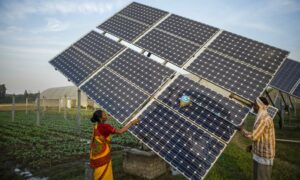
Clean Energy with Clean Conscience: The Importance of Human Rights, Health and Well-Being When Transitioning to Clean Energy for Sustainable Development
United Nations Office of the High Commissioner for Human Rights, World Health Organization, International Service for Human Rights, 2050Today, Geneva Environment Network | 01 June 2022, 14:00-15:00 | Palexpo & Online | Webex

Solar Butterfly 2022
On 23 May 2022, the Climate Pioneer World Tour , featuring the Solar Butterfly, a self-sufficient and solar-powered vehicle led by Louis Palmer, UNEP’s Champion of the Earth in 2011 departed from Geneva.
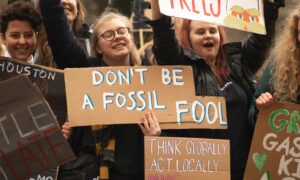
Subsidizing Fossil Fuels in Times of High Energy Prices | Fossil Fuel Subsidy Reform in Trade and Climate Discussions
International Institute for Sustainable Development, Friends of Fossil Fuel Subsidy Reform, Geneva Environment Network | 16 May 2022 | International Environment House II & Online | Webex
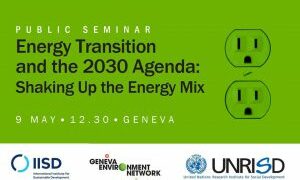
Energy Transition and the 2030 Agenda
IISD, UNRISD, Geneva Environment Network | 09 May 2017, 12:30–14:00 | International Environment House II & Online

Is time up for Nuclear energy in Switzerland and around the world?
Geneva Environment Network | 22 Nov 2016, 12:45–14:00 | International Environment House II
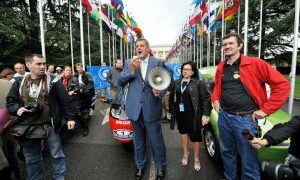
ZERO Race (from Geneva to Cancun) | Around the World in 80 days with Zero Emission Vehicles!
Geneva Environment Network | 16 Aug 2010,
12:00–13:30 | Palais des Nations
Additional Resources
General
- Sustainability | United Nations
- Energy | UNEP
- Renewable Energy | UNEP
- Transport | UNEP
- Sustainable Energy | UNECE
- Energy | IISD
- Future of Energy | World Economic Forum
- Energy Services | WTO
- Energy | UNIGE
- Energy | Ville de Genève
Energy Transition
- The energy transition in a post-war world | World Economic Forum | 22 May 2022
- Fostering Effective Energy Transition 2022 | World Economic Forum | 11 May 2022
- As oil prices spike, new investments in fossil fuels could be disastrous | UNEP | 29 April 2022
- Grand Genève in Transition
- Energy Transition | SIG
- Global Future Council on Energy Transition | World Bank
- The A-Z of the Energy Transition: Knowns and Unknowns | World Economic Forum | 2020
- Harnessing Artificial Intelligence to Accelerate the Energy Transition | World Economic Forum | September 2021
- Accelerating access to sustainable energy: A key priority in energy transition | World Economic Forum | November 2019
- The Speed of the Energy Transition: Gradual or Rapid Change? | World Economic Forum | September 2019
Fossil Fuel Subsidies
- Joint Ministerial Statement on Fossil Fuel Subsidy Reform | WTO | 14 December 2021
- Why fossil fuel subsidies are so hard to kill | Nature | 20 October 2021
- Friends of Fossil Fuel Subsidy Reform
- OFF of the European Energy Transition Conference [in French]
Related Topics
- Commodities at a glance: Special issue on access to energy in sub-Saharan Africa | UNCTAD | 21 March 2023
- Energizing health: accelerating electricity access in health-care facilities | WHO | 14 January 2023
Credits
Photo: The SIG SolarCAD II solar thermal power plant at the SIG-Lignon site.
Photo Credits © Magali Girardin

